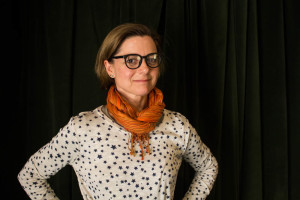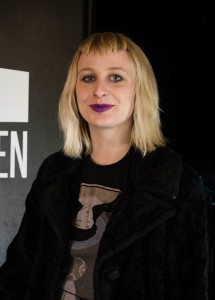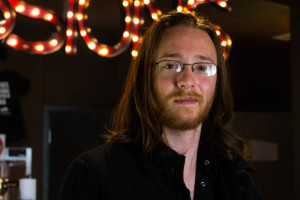Tags
Related Posts
Share This
Women in Cinema

Lisa Lucas is the instructor of the new coarse Women in Cinema. Photo by Christy
“I hate that I have to teach this class,” Lisa Lucas, instructor at the Film School, stated at the very start of the first session. “But someone has to do it.” Women in Cinema is the first ever SFUAD course to focus on women directors and writers of film history.
The contemporary film industry has been defined by more than a century of masculine voices setting the parameters of what qualities make for a good film, but there is no doubt in the class’ open discussions that feminine perceptions capture important insights to storytelling in film. Lucas is especially passionate about resurrecting forgotten female filmmakers and reassessing them in a modern way.
The idea of female filmmakers being disregarded in terms of film history by popular masses angered her. “In my college film courses we had History of Film 101…and while we screened and discussed all of the great classics in chronological order, not one was directed by a woman, with the exception of Triumph of the Will by Leni Riefenstahl. As an aspiring writer and filmmaker, I found this unacceptable and shocking.”

Amy West expresses her enjoyment of the new course, Women in Cinema. Photo by Christy
Amy West, a senior film student and feminist, loves the opportunity to explore complex implications of the industry. “It’s not just about the film we’re watching,” West says. “We’re also thinking about what it means to be a female filmmaker in such a boys club in the context of different points in history. Film history, like most other histories, are written by men.” The class demands a deep exploration of gender, sexuality and feminism within this history.
Unlike other film classes, Women in Cinema ends in a critical discussion whereas other classes similar in style have discussions before viewing of the film. Jacob D’Annunzio, a senior film student and advocate for the class, prefers this method. In a recent class, the students, split evenly between male and female, pass around a microphone, the film, Wanda, written, directed by and starring Barbara Loden, fresh on their minds. This is the eighth film they have seen, with many more to come. They discuss what role a female played in making the film, and whether or not only a woman could explore such themes. “I think this idea is harmful,” D’Annunzio says, “[Women] should just be considered as contemporaries and peers, not as an entirely separate thing.”
Lucas agrees. “Filmmaking is an art that is created by both men and women,” she says. “That we don’t have to say things anymore like ‘oh, that’s a woman’s film’…they reflect the uniqueness of whoever creates them.”

Jacob D’Annunzio outside the screen after his class. Photo by Christy Marshall
The film Wanda is the almost autobiographical story of a woman who, having been abandoned and unloved throughout her life, seeks out abusive relationships with men until she finds one that is not only particularly dangerous and thrilling, but makes her feel for the first time. The class bounces around the term ‘Stockholm syndrome,’ and Lucas, walking through the rows of students, says, “We have to show these kinds of films, even if they make people uncomfortable. We have to show the evolution of women.”
For the Film students at SFUAD, particularly the women, representation matters more than ever. It is not enough to see a woman only in front of the camera. “I look forward to being able to draw strength and inspiration from [all of these amazing women],” West says. “Women certainly get a lot of exposure to masculine cinema, and it’s time both men and women are exposed to a more feminine side. I’m learning that not always, but often, the things that female filmmakers value in their art are different from what male filmmakers value in their art. Neither is better, but only one side has really been represented throughout history and that is reflected in modern cinema.” West says being in Lucas’ class is “so inspiring to me because by watching these films by early female directors that I connect to so strongly really validates that I don’t have to follow what all these white dudes have been doing in cinema for decades to be a good filmmaker.”
There are 100 years of female cinematic history for the Women in Cinema class to investigate, one decade at a time. It is Lucas’ hope that SFUAD will offer future courses that can explore other complexities of the film industry in a similar way.






 Jackalope Magazine is the student magazine of Santa Fe University of Art and Design. Building on the interdisciplinary nature of our education, we aim to showcase the talent of our university and character of our city.
Jackalope Magazine is the student magazine of Santa Fe University of Art and Design. Building on the interdisciplinary nature of our education, we aim to showcase the talent of our university and character of our city.
Recent Comments